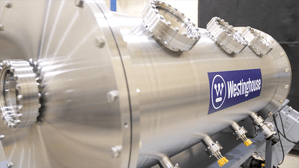In partnership with Bruce Power, Westinghouse recently completed a feasibility study with conclusive results that the eVinciTM micro reactor can provide necessary, clean and cost-competitive energy to decentralized, off-grid markets in Canada. The report focuses on key market opportunities, including remote communities and industrial mines. It also emphasizes the benefits the technology can provide in support of the government policy to meet decarbonization goals in Canada.
“The Canadian government established a Small Modular Reactor Roadmap, setting out the opportunity for nuclear energy to support the country’s decarbonization goals in remote, off-grid communities. The feasibility study shows the unique features and advantages of eVinci micro reactor make it the right solution, including a small footprint, mobility, flexibility, lifespan and cost” said Mike Shaqqo, Senior Vice President for the Advanced Reactors Program at Westinghouse.
A single eVinciTM micro reactor is expected to be between 14% and 44% more economical than a diesel generator, depending upon the price of diesel fuel and the price for carbon. This presents a significant opportunity to power Canada’s remote communities with clean energy. Additionally, in mining scenarios, the eVinciTM micro reactor unit with diesel back-up could reduce carbon emissions by about 90% in Canada.
Canada’s remote communities with clean energy. Additionally, in mining scenarios, the eVinciTM micro reactor unit with diesel back-up could reduce carbon emissions by about 90% in Canada.
“The nuclear industry is a leader in addressing global challenges, and Bruce Power is committed to decarbonizing our economy and helping Canada achieve Net Zero emissions by 2050,” said Heather Kleb, Director, Next Generation Nuclear Technology at Bruce Power. “Nuclear energy is a clean, reliable source of baseload power, and the industry is evolving further with new technologies, such as the eVinci micro reactor, that will expand its clean energy impact.”
The extensive use of eVinci technology in those communities would result in reduction or
removal of their dependence upon expensive diesel generation (90 million liters per year) with a more economical option that reduces greenhouse gas and other emissions.
Learn about even more economic and environmental benefits, as we partner to bring #CleanEnergy to Canada.



